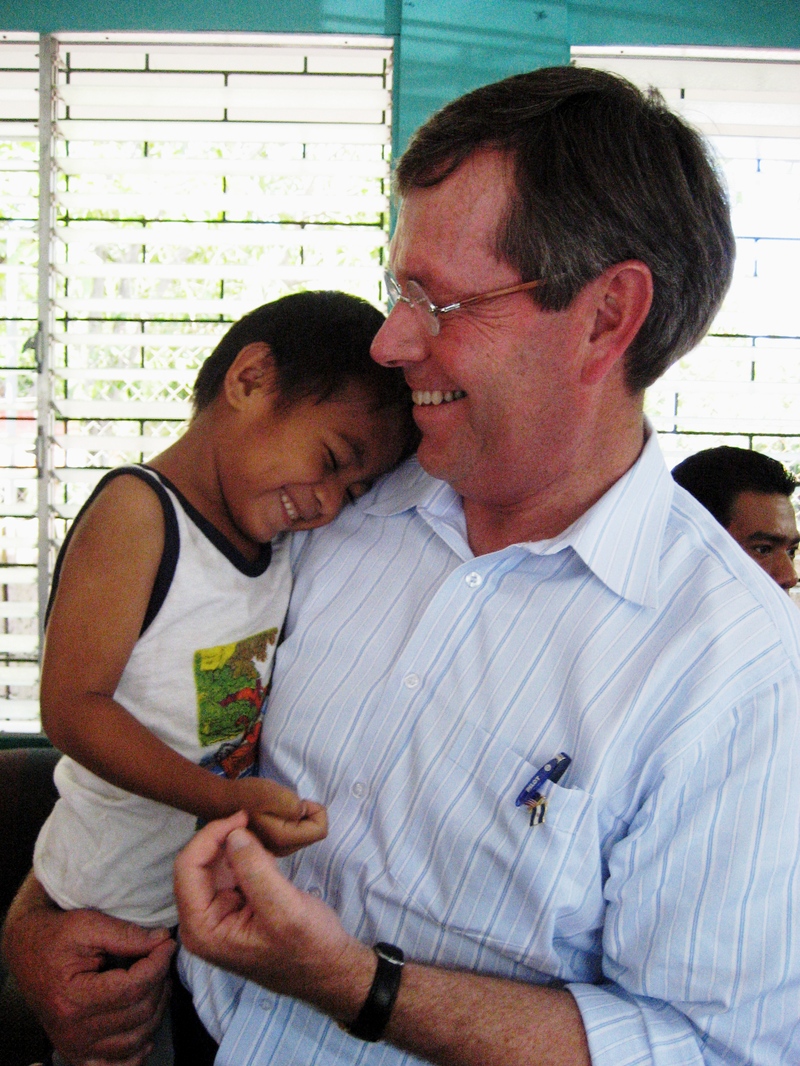Central America Blog II
Written June 26, 2008
Wednesday morning, we drove two hours from San Salvador to Acajutla, a community in El Salvador of about 75,000 people on the Pacific coast where the USS Boxer had visited to care for patients as part of the mission, “Continuing Promise,” in May of this year. The Health Minister of El Salvador met us there to tour a public clinic. While the USNS Comfort had visited a different part of the coast last year, some of the health care professionals around Acajutla have also participated in trainings offered by the Comfort crew.
Like public clinics I have seen in other countries, including our own, people with various needs lined up early in the morning to see one of the doctors or nurses. They are served on a first-come, first-served basis, advancing along a series of benches. There is no air conditioning, the temperature is hot and muggy and patients are served with a wholesale mentality but seem grateful for the help. This is the way health care delivery happens in their world.
There are 369 such clinics like this in El Salvador, the Minister told me, plus another 171 smaller rural health posts. In this particular clinic, there were 25 doctors and a similar number of nurses. There are about 5.4 million people in the nation, about 439,000 of whom live in the department, or province, in which Acajutla is located.
In addition to the clinics, El Salvador has a system of referral hospitals and other public health functions. One of them is a network of health promoters in the neighborhoods who teach healthy practices, encouraging those needing care to get it. For example, women of childbearing years are asked to report the date of their last period so the health promoter can get them into prenatal care if they prove to be pregnant. They know every child under five, watch for signs of communicable disease and generally “promote healthy practices."
I spent an hour talking to some of the doctors, nurses and health promoters, trying to understand what motivates them and their general outlook. The main reason I chose to visit Acajutla was to get a reading on the impact of the USNS Comfort and the USS Boxer a few months after their visits.
What a powerful testimony I heard from these people about the value of these efforts by the U.S. Government. They could not find adequate words to cover the sense of gratitude and professional fulfillment they felt. It was simply inspiring to hear them talk about all they had learned from the doctors on the ships, and the appreciation they felt for the dignity and care with which they felt our crews treated their patients, friends and neighbors.
As moving as I found the meeting with the doctors, the most significant experience of the day was meeting with about 10 patients who wanted to tell me about their cataract surgery, hernia operation or the care given to their children on board the Boxer. Each story related a changed life with a renewed sense of purpose and self-worth.
One woman told me how her blurry eyesight, which was now cured, no longer caused her to fall. She threw her arms around me saying, “Thanks be to God for the United States.”
Another woman told me about reading to her grandchildren for the first time. Another older woman, who was caring for three small, abandoned grandchildren, talked about the difference the visit had made to the little girl with cerebral palsy and her able-bodied brothers.
A man in his late thirties pulled up his shirt to show me the scar of his repaired hernias, and then demonstrated how his mobility and strength had returned, which allowed him to work again.
One after another, they used different words to talk about how the Boxer had restored the productivity of their lives. Those who had cataract surgery particularly moved me. Cuba has aggressively provided this rather simple surgery for tens of thousands all over Central America. The Cubans call the campaign "Operation Miracle," and it has built a reputation for Cuba in the arena of health diplomacy.

Secretary Leavitt and a Salvadoran boy share a laugh at a clinic in Acajutla, El Salvador.
Our hospital ships will return to the region this summer. Doctors and patients of El Salvador are anticipating these visits. This is a powerful tool for our nation, and we need to do more of it.

Secretary Leavitt,
I like the fighting you describe. Cuba v.s. the U.S. in health diplomacy. People getting help that lasts more than a meal.
No fear that aide money goes for a new car, desk or payoff.
Real people seeing multiple governments work.
Rebles disarmend for basic needs are meet at one level. Sigh so many more basic levels need to be meet.
I can not always comment but please do keep posting.
Happy belated 4th of July to you and your staff. Looking forward to Tuesday's (July 8th) HHS webcast. Ms. McCarthy (sp?)
Does a great job.
My biggist worry is gas and the possible lack of latex gloves
"Hong Ray Enterprises of Shijiazhuang, China, the world's largest manufacturer of vinyl exam gloves and a major manufacturer of nitrile gloves, has notified Medline Industries, Inc., and other U.S. customers that they are facing "force majeure conditions" and that they will be unable to meet their normal agreements to customers. Hong Ray is Medline's largest exam glove supplier."
Source:http://www.tradingmarkets.com/.site/news/Stock%20News/1733914/
Regards,
Posted by: Kobie | July 06, 2008 at 02:15 PMKobie
During my years in the Navy we often included some humanitarian functions to promote international relations, but this is fantastic. I don't think you can overestimate the value of these missions.
Posted by: Jim Grapes | July 07, 2008 at 12:48 AM